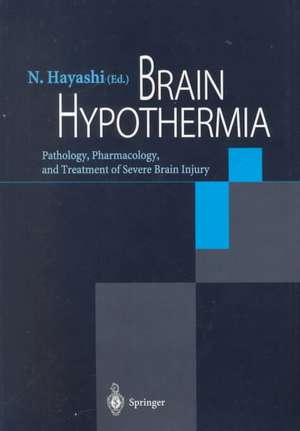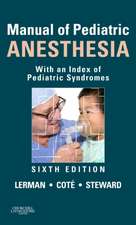Brain Hypothermia: Pathology, Pharmacology, and Treatment of Severe Brain Injury
Editat de N. Hayashien Limba Engleză Paperback – 31 iul 2000
Preț: 367.84 lei
Preț vechi: 387.20 lei
-5% Nou
Puncte Express: 552
Preț estimativ în valută:
70.39€ • 76.44$ • 59.13£
70.39€ • 76.44$ • 59.13£
Carte tipărită la comandă
Livrare economică 22 aprilie-06 mai
Preluare comenzi: 021 569.72.76
Specificații
ISBN-13: 9784431702771
ISBN-10: 4431702776
Pagini: 244
Ilustrații: IX, 231 p. 91 illus.
Dimensiuni: 170 x 244 x 13 mm
Greutate: 0.4 kg
Ediția:2000
Editura: Springer
Colecția Springer
Locul publicării:Tokyo, Japan
ISBN-10: 4431702776
Pagini: 244
Ilustrații: IX, 231 p. 91 illus.
Dimensiuni: 170 x 244 x 13 mm
Greutate: 0.4 kg
Ediția:2000
Editura: Springer
Colecția Springer
Locul publicării:Tokyo, Japan
Public țintă
Professional/practitionerDescriere
Rapid progress in technology and its application to diagnosis and monitoring of brain tissue temperature and metabolism have resulted in advances in the therapy for critically brain-injured patients and breakthroughs in understanding the pathophysiology of brain damage. The latest concept of brain hypothermia therapy clarifies targets such as brain thermal pooling, masking brain hypoxia associated with catecholamine surge, the metabolic shift from glucose to lipids, and selective radical damage of dopamine in the central nervous system. This volume explains the mechanism of brain injury and how brain hypothermia treatment differs from other hypothermia therapy in four major sections: Brain Injury Mechanism, Pathophysiology of Hypothermia, Basic Research of Hypothermia Treatment, and Clinical Studies of Brain Hypothermia. The book is a valuable source for practitioners and researchers in neurosurgery and neurology and in critical care and emergency medicine.
Cuprins
1. Brain Injury Mechanisnn.- Enhanced Neuronal Damage in Severely Brain-Injured Patients by Hypothalamus, Pituitary, and Adrenal Axis Neurohormonal Changes.- 2. Pathophysiology of Hypothermia.- Molecular System Controlling Mammalian Hibernation with Circannual Rhythm.- 3. Basic Research of Hypothernnia Treatment.- Therapeutic Hypothermia in Experimental Models of Traumatic Brain Injury.- Mild Hypothermia Amelioration of Damage During Rat Spinal Cord Injury: Inhibition of Pathological Microglial Proliferation and Improvement of Hind-limb Motor Function.- Local Cooling: Limits on Secondary Injury and Neuronal Death Following Spinal Cord Injury.- Effect of Intraischemic Hypothermia on Expression of c-Fos, c-Jun, and HSP72 After Transient Focal Cerebral Ischemia in Rat Brain.- Neuroprotective Effect of Mild Hypothermia in Experimental Brain Ischemia.- 4. Clinical Studies of Brain Hypothermia.- a. Mechanism.- Spontaneous Cerebral Hypothermia After Severe Head Injury: Relation with Brain Chemistry and Cerebrovascular Parameters.- Effect of Therapeutic Moderate Hypothermia on Extracellular and CSF Intermediates of Secondary Brain Injury.- Significance of Electrophysiologic Studies in Brain Hypothermia.- Mapping Analysis of Brain Tissue Temperature by Magnetic Resonance Imaging.- Bacteria Detected and the Pharmacokinetics of Antibiotics During Brain Hypothermia.- The Clinical Issue and Effectiveness of Brain Hypothermia Treatment for Severely Brain-Injured Patients.- Development and Status of Hypothermia for Brain Injury: National Acute Brain Injury Study: Hypothermia.- Intravascular Volume Expansion During Therapeutic Moderate Hypothermia for Brain-Injured Patients: Preliminary Report.- Treatment of Hyperacute Embolic Stroke with Major Cerebral Artery Occlusion by Mild Hypothermia.- Mild Hypothermia Therapy for Severe Acute Brain Insults in Clinical Practice.- Combined Therapy of Local Intraarterial Thrombolysis and Brain Hypothermia for Acute Occlusion of the Cerebral Main Trunk Arteries.- Mild Hypothermia for Cerebral Resuscitation in Survivors of Out-of-Hospital Ventricular Fibrillation.- New Hypothermia Method Using Blood Cooling System: MONAN and KANEM Method.- 5. Panel Discussion.- Panel Discussion.- 6. Summary.- Summary.
Caracteristici
Provides readers with a new concept of brain injury mechanism
Defines the difference between brain hypothermia treatment and hypothermia treatment
Defines the difference between brain hypothermia treatment and hypothermia treatment









